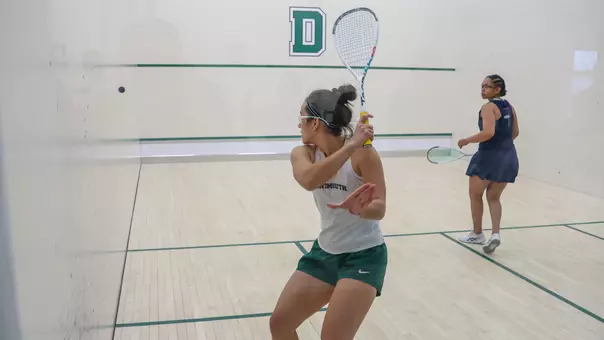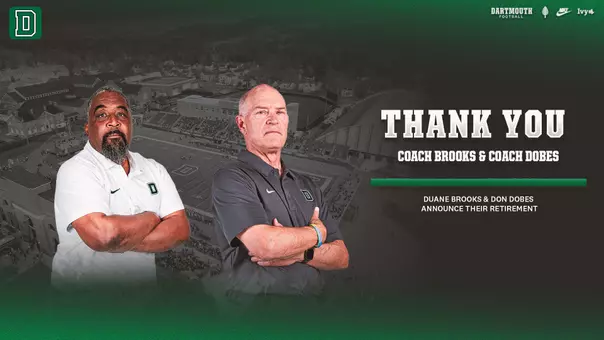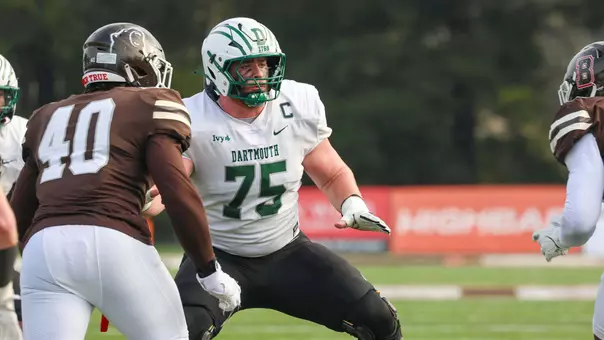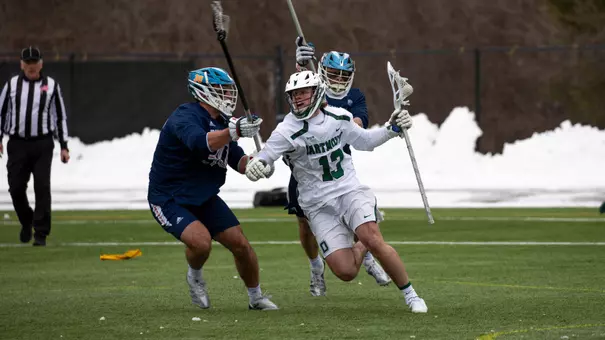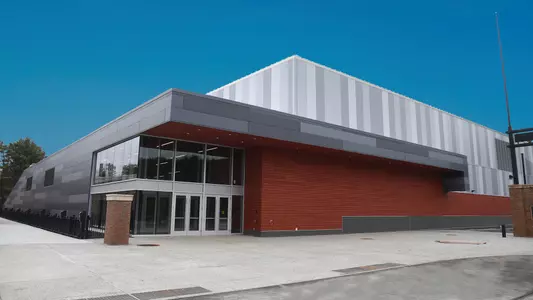
Newest Athletic Facility a Game-Changer for Eight Varsity Teams
4/20/2020 3:30:00 PM | Baseball, Football, Men's Lacrosse, Men's Soccer, Softball, Women's Lacrosse, Women's Rugby, Women's Soccer, Athletics
Dartmouth, the northernmost member of its athletic conference, has completed construction of the largest permanent indoor practice facility in the Ivy League—a powerful affirmation of the College's commitment to athletic excellence and competitiveness.
The 70,000-square-foot Indoor Practice Facility (IPF), with an artificial turf field nearly three times the size of the turf inside the track in Leverone Field House, will transform how hundreds of Dartmouth student-athletes prepare year-round for competition.
"Dartmouth student-athletes all have one thing in common: the drive to take our game to the next level," says Bonnie Shea '21, two-time First Team All-Ivy League defender and co-captain of the Big Green women's soccer team. "The Indoor Practice Facility is one more way Dartmouth is facilitating our pursuit of excellence, and we can't wait to take advantage of it."
The facility's central feature is its 280-by-200-foot practice space, carpeted in FieldTurf, the same synthetic turf used on Memorial Field, Scully-Fahey Field, Red Rolfe Field at Biondi Park, and the Softball Park. It is widely considered the most grass-like artificial surface available, resulting in fewer injuries.
"The impact this state-of-the-art facility will have on our program will be felt for years to come, improving our student-athletes' world-class athletic experience to go along with the world-class education they receive," says Alex Frank, head coach of the women's lacrosse team.
Until now, the climate of northern New England has forced coaches to choose between having their players practice at odd hours in the confines of Leverone during inclement weather or sending them outside to train in the snow, sleet, and cold.
"This facility will truly be a game-changer for our coaches and student-athletes in terms of both training and recruiting," says Director of Athletics and Recreation Harry Sheehy. "We are deeply grateful to President Hanlon, to our Athletics Advisory Board under the leadership of Brad Koenig '80, Chris Jenny '77, and Gregg Lemkau '91, and, most of all, to the extraordinarily generous donors who have made this building possible."
The $27 million IPF is a featured element of The Call to Lead campaign. Private donations, raised since 2016, fully funded the design, construction and long-term operation and maintenance of the facility.
The Call to Lead seeks to prepare the most promising students for a lifetime of learning and responsible leadership through the College's distinctive academic model and experiential learning activities such as athletics. In addition to funding the IPF, campaign donations have endowed 14 positions in Athletics and are in the process of endowing the College's industry-leading Dartmouth Peak Performance, a comprehensive initiative supporting the holistic development of all 1,000 varsity athletes.
"Athletics provide a powerful laboratory for leadership development, and I'm incredibly proud of our student-athletes who graduate from Dartmouth and become leaders in fields all across society, armed with skills honed in competition and on the practice field," says President Philip J. Hanlon '77.
The building, to be formally dedicated this fall, is located adjacent to the Boss Tennis Center and Scully-Fahey Field, in Dartmouth's east athletic campus. The new Reilly Pavilion next door, which houses locker rooms, sports medicine facilities, and a meeting room for five teams, was dedicated last year.
The IPF's primary users will be men's and women's lacrosse, men's and women's soccer, women's rugby, football, baseball, and softball, which represent more than one-third of all Dartmouth varsity student-athletes.
With those eight teams no longer relying upon Leverone during inclement weather, other varsity and club sports, including several teams that have had little or no access to indoor practice space, will be able to train in Leverone.
For football practices, the IPF offers a surface that is the full width of a regulation field and 75 yards long, with an additional 10 yards for an end zone. A retractable goalpost for football and rugby is also included at the south end of the building.
"The impact of this facility is already being felt, as it was a major factor in our recruiting process, even while under construction," says Buddy Teevens '79, the Robert L. Blackman Head Football Coach. "It's the best facility in the Ivy League, by far, and our players will love practicing in there."
Lacrosse, soccer, and rugby teams will have the option of using the field lengthwise or crosswise, depending on the type of drill.
The facility includes two batting tunnels for baseball and softball, separate from the main field. Also included are a main lobby, satellite training room, multi-purpose room, and two filming platforms. Because the IPF is not a game venue, there is no spectator seating, but the building features a viewing gallery for visiting recruits, alumni, and others.
The project architect was Sasaki Associates of Watertown, Massachusetts, and the general contractor was Engelberth Construction of Colchester, Vermont. The construction was completed on schedule and on budget.

